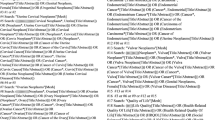Abstract
Purpose
The primary purpose of this study is to evaluate health-related quality of life (HR-QOL) of gynecologic cancer patients undergoing laparotomy.
Methods
Women who underwent laparotomy by gynecologic cancer completed the European Organization for Research and Treatment of Cancer (EORTC) Quality of life questionnaires (QLQ‐C30 and QLQ‐OV28) presurgery and at 1 month.
Results
Of the 181 women studied between January 2007 and March 2008, 116 women (64.1 %) had ovarian cancer, 27 (14.9 %) had cervical cancer, and 29 (16.0 %) had endometrial cancer. By 1 month post-surgery, there was a significant decrease in HR-QOL on the global, abdominal/gastrointestinal (GI) score, body image, chemotherapy side effects, and other single items of the OV28 questionnaire, as well as on physical, role and social functioning, fatigue, nausea and vomiting, pain, insomnia, constipation, appetite loss, and financial difficulties items on C30 questionnaires. Emotional functioning on C30 questionnaires was significantly improved 1 month after surgery. The majority of these items persisted 1 month after surgery only in patients with ovarian cancer. Abdominal/GI score on OV28 questionnaires as well as role and physical functioning on C30 questionnaires were significantly lower between baseline and postsurgical HR-QOL in women with other gynecologic malignancies.
Conclusion
The results suggest a significant impact of HR-QOL among gynecologic cancer patients 1 month after laparotomy, particularly among those with ovarian cancer.

Similar content being viewed by others
References
http://www.cancer.gov/. Accessed 20 February 2012
http://www.nccn.org/professionals/physician_gls/f_guidelines.asp. Accessed 20 February 2012
Matsushita T, Murata H, Matsushima E et al (2007) Emotional state and coping style among gynecologic patients undergoing surgery. Psychiatry Clin Neurosci 61:84–93
Cella DF, Bonomi AE (1998) Measuring quality of life. In: Pazdur R, Coia LR, Hoskins WJ et al (eds) Cancer management: a multidisciplinary approach, 2nd edn. PRR Inc, Huntington, pp 807–814
Carlsson M, Strang P, Bjurstrom C (2000) Treatment modality affects long-term quality of life in gynaecological cancer. Anticancer Res 20:563–568
Kornblith AB, Thaler HT, Wong G et al (1995) Quality of life of women with ovarian cancer. Gynecol Oncol 59:231–242
Minig L, Biffi R, Zanagnolo V et al (2009) Early oral versus “traditional” postoperative feeding in gynecologic oncology patients undergoing intestinal resection: a randomized controlled trial. Ann Surg Oncol 16:1660–1668
Minig L, Biffi R, Zanagnolo V et al (2009) Reduction of postoperative complication rate with the use of early oral feeding in gynaecologic oncologic patients undergoing a major surgery: a randomized controlled trial. Ann Surg Oncol 16:3101–3110
Aletti GD, Santillan A, Eisenhauer E et al (2007) A new frontier for quality of care in gynecologic oncology surgery: multi-institutional assessment of short-term outcomes for ovarian cancer using a risk-adjusted model. Gynecol Oncol 107:99–106
Benedet JL, Bender H, Jones H 3rd et al (2000) FIGO staging classifications and clinical practice guidelines in the management of gynecologic cancers. FIGO Committee on Gynecologic Oncology. Int J Gynaecol Obstet 70:209–262
Aaronson NK, Ahmedzai S, Bergman B et al (1993) The European Organization for Research and Treatment of Cancer HR-QOL C30: a quality-of-life instrument for use in international clinical trials in oncology. J Natl Cancer Inst 85:365–367
Greimel E, Bottomley A, Cull A et al (2003) An international field study of the reliability and validity of a disease-specific questionnaire module (the QLQ-OV28) in assessing the quality of life of patients with ovarian cancer. Eur J Cancer 39:1402–1408
http://groups.eortc.be/qol/documentation_manuals.htm. Accessed 20 February 2012
Greimel E, Thiel I, Peintinger F et al (2002) Prospective assessment of quality of life of female cancer patients. Gynecol Oncol 85:140–147
von Gruenigen V, Gil K, Frasure H et al (2005) The impact of obesity and age on quality of life in gynecologic surgery. Am J Obstet Gynecol 193:1369–1375
Eisemann M, Lalos A (1999) Psychosocial determinants of wellbeing in gynecologic cancer patients. Cancer Nurs 22:303–306
Basen-Engquist K, Bodurka-Bevers D, Fitzgerald MA et al (2001) Reliability and validity of the functional assessment of cancer therapy-ovarian. J Clin Oncol 19:1809–1817
Bhattacharya SM, Jha A (2010) A comparison of Health-Related Quality of Life (HRQOL) after natural and surgical menopause. Maturitas 66:431–434
Teplin V, Vittinghoff E, Lin F, Learman L et al (2007) Oophorectomy in premenopausal women health-related quality of life and sexual functioning. Obstet Gynecol 109:347–354
Vernooij F, Heintz P, Witteveen E et al (2007) The outcomes of ovarian cancer treatment are better when provided by gynecologic oncologists and in specialized hospitals: a systematic review. Gynecol Oncol 105:801–812
Chan YM, Ngan HYS, Li BYG et al (2001) A longitudinal study on quality of life after gynecologic cancer treatment. Gynecol Oncol 83:10–19
Eisemann M, Lalos A (1999) Psychosocial determinants of wellbeing in gynecologic cancer patients. Cancer Nurs 22:303–306
Acknowledgments
The authors thank Carmen Beltrami, RN; Emanuella D’Anna; and all the nursing staff of the Gynecologic Department, European Institute of Oncology, Milan, Italy for their active participation in the execution of this study. Finally, the authors recognize the great efforts made by Anna Attanasio (Anesthesiology Department, European Institute of Oncology, Milan, Italy) and Maira Bigioggero (data manager, Gynecologic Department, European Institute of Oncology, Milan, Italy) in retrieving the data. This research was supported, in part, by the Intramural Research Program of the National Human Genome Research Institute, National Institutes of Health.
Conflict of interests
The authors declare that they have no conflict of interests.
Author information
Authors and Affiliations
Corresponding author
Rights and permissions
About this article
Cite this article
Minig, L., Vélez, J.I., Trimble, E.L. et al. Changes in short-term health-related quality of life in women undergoing gynecologic oncologic laparotomy: an associated factor analysis. Support Care Cancer 21, 715–726 (2013). https://doi.org/10.1007/s00520-012-1571-z
Received:
Accepted:
Published:
Issue Date:
DOI: https://doi.org/10.1007/s00520-012-1571-z




